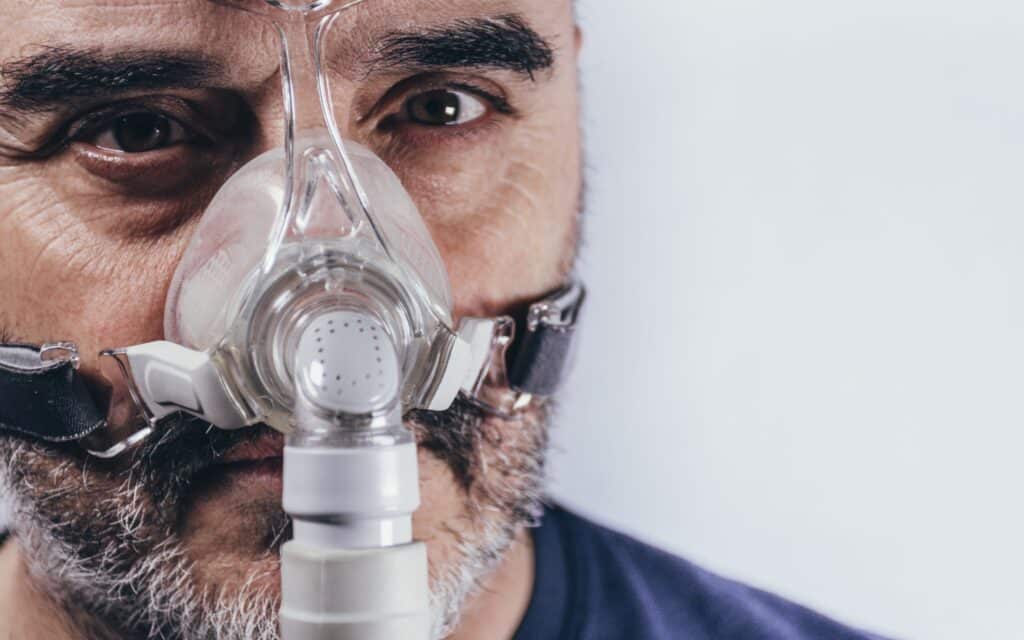When left unchecked, stress can lead to endless health issues, from depression and anxiety to high blood pressure, heart attacks, and stroke. Today we’re going answer the question: Can stress cause sleep apnea?
Studies show stress levels could indeed influence your sleep quality too. Stress and sleep apnea still have a somewhat confusing relationship in the eyes of science. On the one hand, it seems clear stress does have some negative influence on sleeping patterns.
Exposure to excess stress can create changes in brain waves and prompt conditions which increase the likelihood of conditions like sleep apnea.
On the other hand, it’s difficult to define exactly what kinds of stress lead to sleep apnea, and whether other factors may lead to higher levels of risk. Sleep apnea and anxiety are closely linked, and treating one might alleviate the other.
So, can sleep apnea be caused by anxiety or stress? Let’s find out…
What is the main cause of sleep apnea?
Sleep apnea is a common but worrying sleep disorder. People with sleep apnea experience significantly disrupted sleeping patterns, caused by trouble breathing during the night.
Around 2-9% of people currently suffer from this condition. When allowed to progress, sleep apnea can cause severe symptoms and side effects.
Research into sleep apnea reveals a number of risk factors associated with sleep apnea. In the case of obstructive sleep apnea (OSA), common causes range from anatomical characteristics (like the shape of a jaw and neck), to the use of sedatives and alcohol.
Smokers, people who sleep on their back, and those with a family history of sleep apnea are also more likely to experience the condition. Plus, a 10% increase in weight can lead to a six-fold increase in OSA risk.
Aside from these well-known risk factors, further relationships are now being discovered. Particularly when it comes to the connection between sleep apnea and mental health.
PTSD, for instance, may increase your risk of sleep apnea, by making it harder to engage in the right levels of REM sleep. If PTSD has a link to sleep apnea, it only makes sense stress would too.
The relationship between stress and sleep apnea
So, can anxiety cause sleep apnea? Does increased stress make you more likely to suffer from OSA?
Currently, there appears to be no direct link between sleep apnea and stress. However, many conditions which contribute to the development of sleep apnea do have roots in chronic stress. Because of this, experts believe stress and sleep apnea may be indirectly linked.
As most people already know, stress and anxiety can definitely interfere with sleeping patterns and cause sleep problems. Around 40 million Americans experience chronic sleep disorders (like sleep apnea). Mental health conditions like stress are some of the most common health issues associated with insufficient sleep.
Experts believe stress and anxiety can intensify existing sleep problems, like sleep apnea, and make it harder to get a good night’s sleep. Stress stops you from “shutting down” properly at night.
Notably, sleep issues aren’t exclusive to people with mental health conditions. Studies show a link between living an especially stressful life, and sleep apnea.
Research recently conducted during the COIVD pandemic found around 40% of participants had moderate or severe sleep apnea, defined by drops in oxygen saturation levels during sleep.
Further statistical analysis also showed sleep apnea was commonly linked to high levels of stress, and issues with insomnia.

Structural brain changes in sleep apnea and anxiety or stress
Researchers suggest sleep apnea and stress are connected. Although it’s difficult to draw a conclusion that stress directly causes sleep apnea. It’s more likely that stress causes the physical and psychological conditions which make sleep apnea more likely.
For instance, sleep apnea may happen as a result of bruxism – the act of grinding your teeth or clenching your jaw during sleep. Bruxism is a stress-related disorder affecting around 25% of Americans. Around 70% of all bruxism is caused by excessive anxiety and stress.
Notably, the increase of cardiovascular arousal during bruxism can have the same impact on the body as when you begin breathing after an apneic pause. If you have high stress levels, bruxism and sleep apnea, your REM sleep is likely to be more disturbed. Disturbed REM sleep leads to a lower quality of sleep.
A study published in 2021 found sleep apnea patients generally show higher levels of psychological stress, as well as additional anxiety and depressive symptoms.
In this study, the researchers found stress was a consistent symptom present in cases of obstructive sleep apnea, Perhaps even more interestingly, the researchers also found anxiety and depression have an impact on the anatomical structure of the brain, similar to the anatomical changes which happen during OSA.
Other studies have also highlighted a connection between sleep apnea and stress or anxiety in the past. This research revealed the frequency of anxiety in patients with obstructive sleep apnea is higher than in the general population, regardless of gender.
Can sleep apnea cause anxiety?
The short answer is yes. It could be caused by carbon dioxide retention after apnea attacks, or just simply because of the levels of sleep deprivation these people experience.
Current research into sleep apnea and anxiety seems to suggest the relationship between the two conditions is bidirectional, similar to the link between sleep apnea and PTSD. Remember, one study found the biggest cause for increased risk of sleep apnea in 76% of veterans in 2018 was PTSD.
Stress can make the risk of sleep apnea and other chronic sleep disorders more likely. Stress and anxiety prompt physical symptoms like weight gain. This makes sleep apnea more probable to occur.
At the same time, sleep apnea, by reducing the amount of quality sleep we’re able to get when we do drift off, makes cases of stress and anxiety worse.
Sleep apnea can also interfere with treatment for depression. It could increase the risk of suicidal thoughts for patients with major depressive disorder. Therefore complicating compliance with any kind of sleep apnea treatment.
In some cases, sleep apnea can also be misdiagnosed as depression, because the two have such similar symptoms.

Can reducing stress help sleep apnea?
Stress and sleep apnea often go hand-in-hand. The presence of one condition makes the other worse. This means if you’re extremely stressed, you’re more likely to suffer from worse symptoms of sleep apnea.
If you’re experiencing sleep apnea, your feelings of stress, depression, and anxiety will worsen too. This all leads to a dangerous cycle.
Since sleep apnea and stress are clearly connected on a cyclical level, it’s fair to say reducing stress can lower your risk of severe sleep apnea symptoms too.
Dealing with stress through strategies like meditation and therapy can improve your sleeping pattern overall. Though it is important to ensure you’re getting the right treatment for sleep apnea.
Most cases of OSA will require specific treatment using a CPAP machine, to help reduce the obstruction which can block the airways. You can improve the outcomes of CPAP therapy by:
Managing your stress levels
Try journaling, meditation, or taking a hot bath before bed to help you relax. The more relaxed you feel, the easier it will be to fall asleep, and a have a healthy night of rest. The better your sleep, the less problematic your sleep apnea symptoms are likely to be.
Practice sleep hygiene
Use the right strategies to keep your bedroom comfortable and uncluttered. Blackout shades help to keep the room dark at night. Consider using fans and air condition to keep your room cool too or open a window.
Get plenty of exercise
Exercise can lower your risk of sleep apnea and stress in a number of ways. The positive influence of exercise on stress and depression are well document, helping to control your dopamine and endorphin levels.
Exercise also helps to reduce your exposure to stress hormones like cortisol. At the same time, exercising helps you to maintain a healthy BMI – important when you consider the most common cause of OSA is obesity.
Is stress causing your sleep apnea?
It’s unlikely stress alone is directly causing you to experience symptoms of sleep apnea. However, high levels of stress disrupting your sleep could make an already existing sleep apnea worse. This means you should go and seek out the right treatment for your stress condition. Hereby you improve your health in the long term.
If you’re worried you may be experiencing sleep apnea, due to symptoms like daytime drowsiness, sudden waking during the night, and evidence of snoring, it’s crucial to seek guidance from a doctor.
If your stress levels are worsening your condition, your doctor will be able to provide advice on how you can manage your stress.
At the same time, speaking to a doctor will also help you to determine whether additional treatment is needed for your condition, such as a CPAP machine.
Siestio. Sleep matters.
Medical disclaimer
You must not rely on the information provided on our website as an alternative to medical advice from your doctor or other healthcare professionals. For more information read our full disclaimer here.







